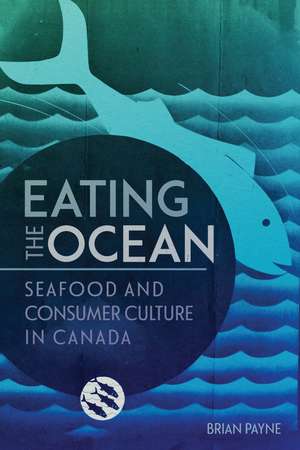Eating the Ocean: Seafood and Consumer Culture in Canada: La collection Louis J. Robichaud/The Louis J. Robichaud Series, cartea 2
Autor Brian Payneen Limba Engleză Paperback – dec 2022
During the first half of the twentieth century, Canadian fisheries regularly produced more fish than markets could absorb, driving down profits and wages. To address this, both industry and government sought to stimulate domestic consumption via increased advertising. In Eating the Ocean Brian Payne explores how government-funded marketing called upon Canadian housewives to prepare more seafood meals to improve family health and aid an industry central to Canadian identity and heritage. The goal was first to make seafood a central element of a “wholesome” diet as a solution to a perceived nutritional crisis, and, second, to aid industry recovery and growth while decreasing Canadian fisheries’ dependency on foreign markets. But fishery managers and policymakers fundamentally miscalculated consumer demand, wrongly assuming that Canadians could and would eat more seafood. Fisheries continued to extract more fish than the environment and the market could sustain, and the collapse of the nation’s fisheries that we are now seeing has as much to do with failed assessments of market demand as it does with faulty extraction practices. Using internal communications between industry leaders and Ottawa bureaucrats, as well as advertising and promotional material published in the nation’s leading magazines, national and local newspapers, and radio programming, Eating the Ocean traces the flawed understanding of not only supply but demand, a misguided gamble that caused fisheries to become the most mismanaged resource economy in early-twentieth-century Canada.
Preț: 282.24 lei
Nou
Puncte Express: 423
Preț estimativ în valută:
54.01€ • 56.39$ • 44.70£
54.01€ • 56.39$ • 44.70£
Carte indisponibilă temporar
Doresc să fiu notificat când acest titlu va fi disponibil:
Se trimite...
Preluare comenzi: 021 569.72.76
Specificații
ISBN-13: 9780228015987
ISBN-10: 0228015987
Pagini: 272
Ilustrații: 17 photos
Dimensiuni: 152 x 229 x 10 mm
Greutate: 0.4 kg
Editura: McGill-Queen's University Press
Colecția McGill-Queen's University Press
Seria La collection Louis J. Robichaud/The Louis J. Robichaud Series
ISBN-10: 0228015987
Pagini: 272
Ilustrații: 17 photos
Dimensiuni: 152 x 229 x 10 mm
Greutate: 0.4 kg
Editura: McGill-Queen's University Press
Colecția McGill-Queen's University Press
Seria La collection Louis J. Robichaud/The Louis J. Robichaud Series
Recenzii
“The chapters in this book seamlessly blend into each other, making for a coherent whole, and Payne makes good use of his extensive array of sources. The narrative is laid out in an absorbing way as Payne takes great care to assign agency and voice to a vast set of actors, involved more or less directly in the fisheries business. appreciated. This study will surely find an audience outside the fisheries history specialization. It makes for an engaging reading for students and scholars of environmental, economic, and food and nutrition history, and gender and media studies, as well as those generally interested in the history of consumerism.” H-Environment
“Eating the Ocean offers insights into an important – but entirely neglected – aspect of the many wrongheaded fisheries policies of the twentieth century that have culminated in the dreadful situation of so many of the world’s current fisheries. Brian Payne makes a clear and very well-documented case that it was the focus on consumption that led to overproduction, overfishing, and a tremendous waste of resources.” Jennifer Hubbard, Toronto Metropolitan University and author of A Science on the Scales: The Rise of Canadian Atlantic Fisheries Biology, 1898–1939
Notă biografică
Brian Payne is professor of history and Canadian studies at Bridgewater State University in Massachusetts.
Descriere
During the first half of the twentieth century, Canadian fisheries regularly produced more fish than markets could absorb. In Eating the Ocean, Brian Payne explores how government-funded marketing encouraged consumers to increase their seafood consumption, and how this advertising endeavour contributed to the collapse of the nation’s fisheries.



